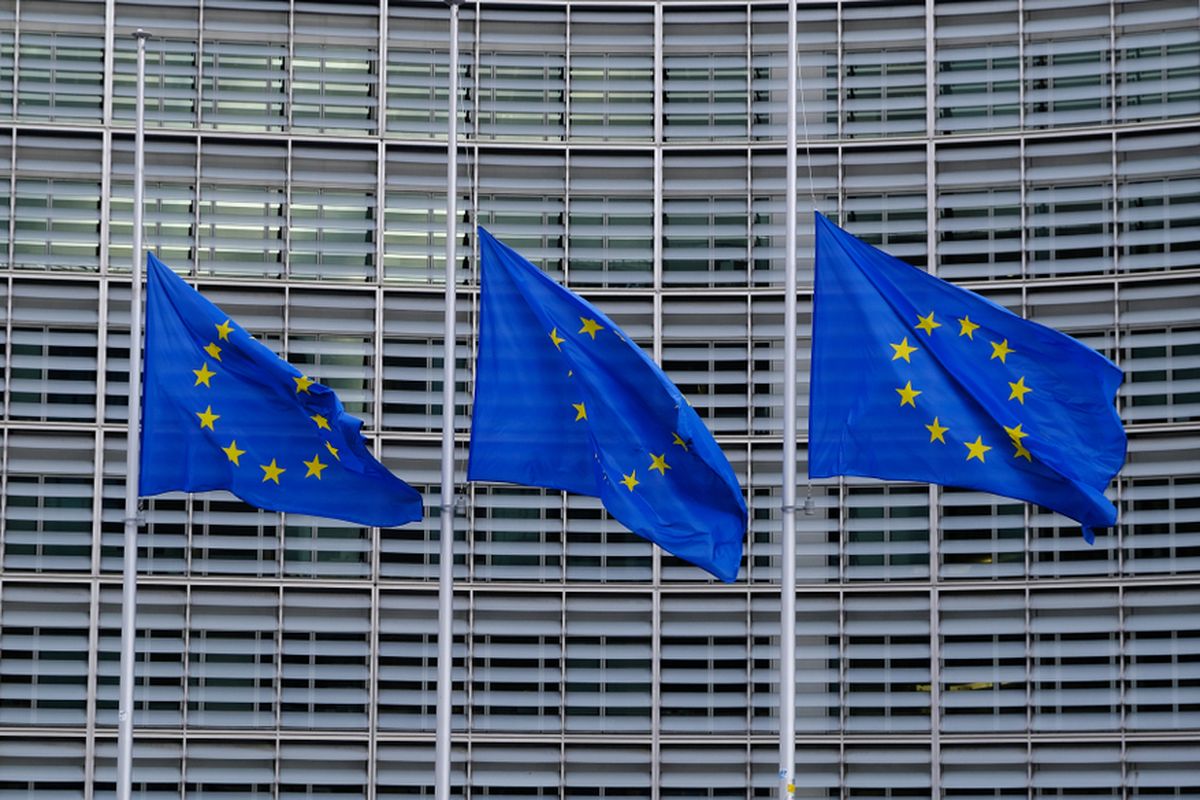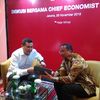Down to the Wire as EU Leaders Discuss Coronavirus Recovery Fund

BRUSSELS, KOMPAS.com — A €1.85 trillion or around $2.1 trillion EU budget hangs in the balance as European Union (EU) leaders admitted that an agreement is still far from reach.
EU leaders held a budget summit to discuss a virus recovery fund.
Each government leaders were seated apart in line with Covid-19 health protocols to keep all attendees safe at their summit center.
Read also: Indonesia's Trade Talks Must Go On amid Pandemic: Trade Ministry
"The differences are still very, very big and so I can't predict whether we will achieve a result this time," said German Chancellor Angela Merkel upon arriving at the Europa summit site.
"So I expect very, very difficult negotiations," Merkel continued.
The 27 EU leaders are facing unprecedented obstacles resulting from the coronavirus pandemic.
The EU bloc is experiencing the worst recession in history and member-states are at odds over who should pay the most.
Read also: Ranks of the Poor Swell by 1.63M in Indonesia Due in Part to Coronavirus Pandemic
Then there is the debate over which nations ought to receive the most aid to revive their battered national economies.
Having arrived on Thursday, French President Emmanual Macron took the lead with early negotiations where he used the pre-summit house to meet with Dutch Prime Minister (PM) Mark Rutte.
The Dutch PM is considered one of the bloc’s biggest obstacles in reaching a deal at the two-day meeting due to his position as a stringent budget hardliner.
"I am not optimistic, but you never know. Nobody wants another meeting," said Rutte.
Macron underscored the importance of the challenge.
"The coming hours will be absolutely decisive," he said. "It is our project Europe that is at stake," stated Macron.
What is slated as a two-day summit could go even longer, if necessary, to bridge the differences between leaders.
"We want a result and we will continue working until we get that result," if need be until Sunday, said Latvian Prime Minister Arturs Karins upon arrival.
No early breakthroughs in pre-summit talks were reported.
"The crisis brought about by this pandemic, with all of its economic and social consequences, is the most severe we have had to face since the Second World War," European Council President and summit host Charles Michel said late Thursday.
The urgency is such that the leaders have ended a string of coronavirus-enforced videoconference summits and are meeting in person for the first time since the pandemic began its devastating sweep around the globe.
The usual summit venue, an intimate room high up in the urn-shaped Europa center, was deemed too snug to be safe, and instead, the leaders have been sent down to meeting room EBS-5, whose 850 square meters (9,150 square feet) normally fits 330 people.
Delegations will be cut to a minimum, leaving leaders more dependent on their own knowledge of complicated dossiers.
Read also: Jakarta's Reopening Still at 50 Percent Capacity until July 16
It should put a smile on the face of German Chancellor Angela Merkel, who has been in office for 15 years and seen countless leaders come and go.
Since the pandemic struck, she is seen as a safe pair of hands to lead her country through the crisis and now that Germany holds the rotating six-month EU presidency her stature will be even greater at the summit.
And throw in that she is celebrating her 66th birthday on Friday. There may be cake but it will hardly be a cakewalk for Merkel.
The members were already fighting bitterly over the seven-year, 1-trillion-euro EU budget when COVID-19 was still a local story in Wuhan, China, late last year.
Then the virus hit the EU head-on and estimates are now that the economy of the 19 countries that use the euro currency will contract by 8.7% this year.
It sent the EU into a panic as it was at a loss on how to coordinate policies of its member states early on.
Now, the EU's executive is proposing a 750-billion-euro recovery fund, partly based on common borrowing, to be sent as loans and grants to the neediest countries.
Merkel, who is in her last term and has her political legacy at stake, already got Germany to agree to join in a common debt program to alleviate the economic suffering in mostly southern and eastern member states.
And she has agreed to include grants and not just loans in the recovery package to avoid overburdening member states with high debt already.
Rutte doesn't like that and Dutch officials said they would stick to their tough line going into the summit, raising the specter that a further summit might be needed.
There are also plans to link budget funds to respect for basic democratic rights that the European Parliament says are under threat in nations like Hungary and Poland.
Some eastern European nations will be objecting to having that as part of the deal.
Hungarian Prime Minister Viktor Orban was clear upon departure that he would fight any such strings attached to the plan.
"The Hungarian position is clear: Hungarians should decide about Hungarians' money," he said. (Writer: Raf Casert, Mike Corder)
Source: https://apnews.com/8d2d9b29b19f1f8833955c673509f55a
Simak breaking news dan berita pilihan kami langsung di ponselmu. Pilih saluran andalanmu akses berita Kompas.com WhatsApp Channel : https://www.whatsapp.com/channel/0029VaFPbedBPzjZrk13HO3D. Pastikan kamu sudah install aplikasi WhatsApp ya.

































